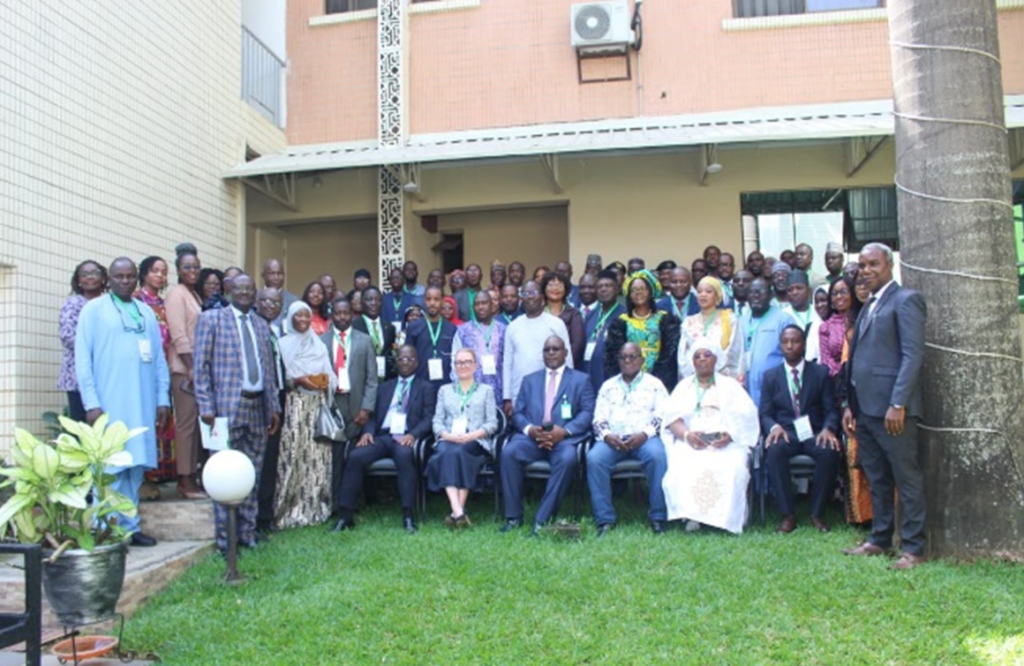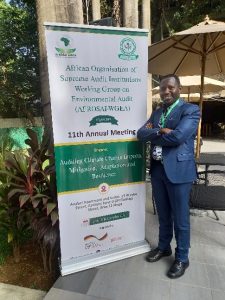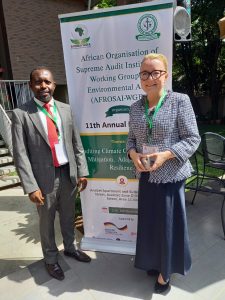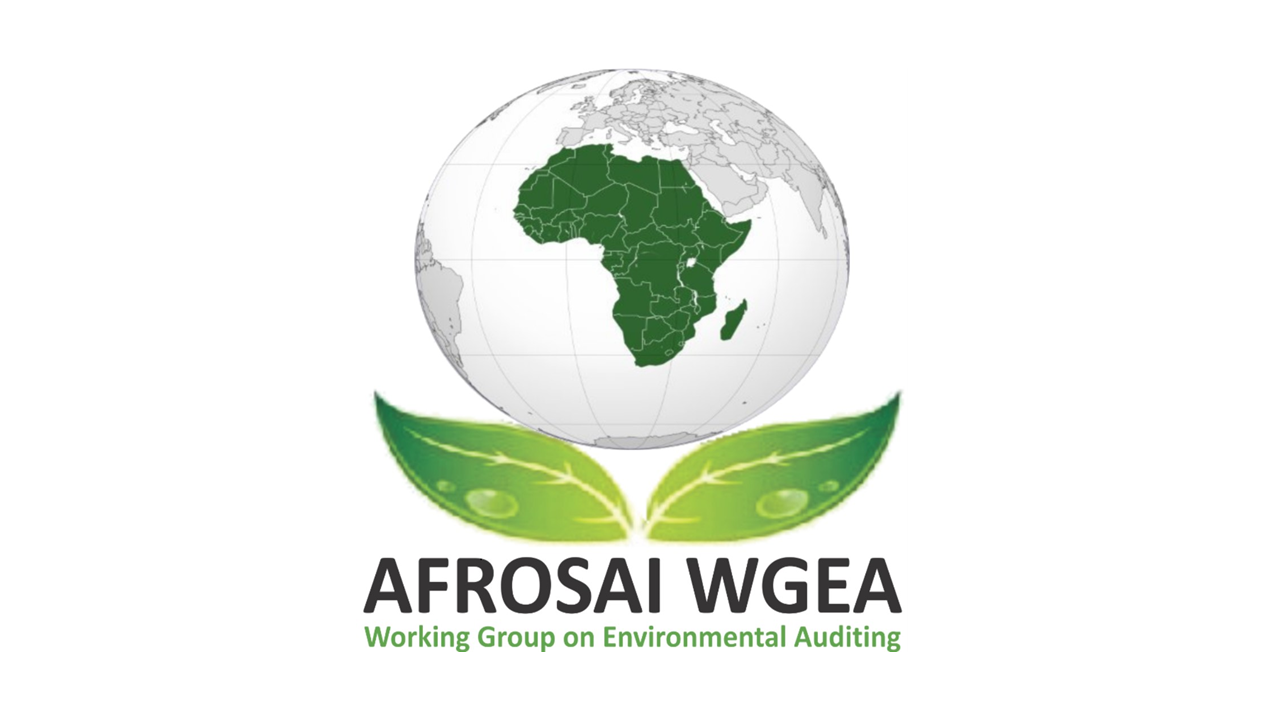By Juvenal Habiyambere
The issues of Environment and sustainability have become topical and constantly bringing discussions around the globe. Selecting “Auditing climate change impacts, mitigation, adaptation and resilience” as the theme for the 11th AFROSAI-WGEA annual meeting proves how important it is for the WGEA to provide SAIs with basic knowledge underpinning the phenomenon and the methodology relevant to the audit of such an aspect for their meaningful contribution to mitigate and adopt to climate change.
The Working Group on Environmental Audit (WGEA) of the African Organisation for Supreme Audit Institutions (AFROSAI) held its 11th annual meeting on 27-30 November2023 in Abuja, Nigeria under the theme “Auditing climate change impacts, mitigation, adaptation and resilience” A meeting of this magnitude was last held virtually in 2020, because of the corona virus pandemic.
This meeting aimed at increasing the knowledge of participants, sharing of experience and provided the opportunity to discuss and decide on the strategic direction of the Working Group taking into consideration the recent developments of AFROSAI’s governance structure and reorganisation. The first day of the event was dedicated for the training on climate change, several training sessions were provided with the facilitation by industry specialists and experts. Dr Vivi Niemenmaa, Secretary of the INTOSAI-WGEA and Mr Michael Malabeja, a regional performance audit expert in the subject, were instrumental during this one-day training and during the rest of the meeting.
Following the successful training on 27th November, the 11th annual meeting took place from 28-30 November 2023 with the last day reserved for the excursion, during which participants visited the National Park Services of Nigeria and got the opportunity to have a first hands experience with the management of the environment and resulting opportunities and challenges in Nigeria.
The mandate of the WGEA is to:
- contribute to Supreme Audit Institutions (SAIs’) understanding of specific issues related to environmental auditing;
- facilitate the exchange of information and experiences between SAIs on environmental issues;
- develop environmental audit tools, their dissemination and dissemination of other documents developed by sister organizations and;
- strengthen existing communication links between the INTOSAI WGEA, other INTOSAI regional working groups, technical and financial partners, stakeholders and NGOs with environmental related activities.


The 2023 annual meeting, which was officially opened by Mr Shaakaa Kanyitor Chira, Auditor General for the Federal Republic of Nigeria and President of AFROSAI-WGEA, was physically attended by 85 participants from 13 SAIs. The meeting was also open for online attendance. The 11th AFROSAI-WGEA annual meeting participants included also academicians, hydrologists, Civil Society Organisations (CSOs), researchers and officials from the Nigerian public environmental entities such as the National Park Service (NPS), the Ministry of Environment, the National Agency for the Great Green Wall, the Hydrological Services Agency, the National Biosafety Management Agency, etc.
In his opening remarks, the Auditor General for the Federation (AuGF) emphasized that the Working Group on Environmental Audit provides a unique platform for the collaboration, for knowledge sharing and capacity building among SAIs, allowing a better understanding of the complexities surrounding climate change and provides at the same time the opportunity for SAIs to collaborate for the design of adequate, robust and common audit methodologies to address climate change related issues.
The meeting featured several panel discussions, experts’ presentations and countries experiences on how far the SAIs have gone with integrating environment in their routine audit work. SAI Kenya and SAI Nigeria discussed their stand and experiences with regards environmental audit and related works. It is important that SAIs help governments to realize impact of climate change. Today, we are witnessing an unprecedented number of disasters such as heavy rains, floods, drying up of certain water reserves and an acute heat among others among several other challenges. The fauna and flora are enormously affected which in turn affects the lives of citizens.
The survival of human beings depends on the ability to adequately conserve biodiversity and the environment. The involvement of auditors and accountants in the ongoing discussions on the impact from climate change showcases that these topical issues have become a concern of everyone. There is a hope that any collaboration between those on frontline of the battle and those in the oversight will create more synergy. Dr Niemenmaa, Secretary General of INTOSAI-WGEA, discussed the magnitude of the issues related to climate change. Science, data and available statistics have proven that Africa is the most hit by the impact of climate change though it is evident that its contribution to climate change is not that significant in global arena. Addressing the audience, Mr Juvenal Habiyambere, Technical Advisor at GIZ, recalled the objective of the Good Financial Governance in Africa Programme (GFG) and its dedication to support SAIs to play their role in mitigating and adapting to climate change impact. Because of being central to the governance ecosystem, citizens place high reliance on SAIs which are expected to hold governments accountable for their actions and inactions in areas affecting citizens.
In this regard, the environment and climate change ought to be among the pressing issues to be addressed by SAIs. SAIs are encouraged to carry out well-timed and continuous audits to review countries’ policies, various programmes dealing with the climate change and environmental result in sound recommendations to governments to address the issues. Audit reports can prompt and inform the formulation of relevant policies and strategies at country and regional level to address and adapt to climate change impact.


The support of GFG is appreciated in supporting the AFROSAI WGEA for the fulfilment of its mandate. Much has been accomplished together in the last few years such as the audit of the drying of lake Chad. The programme is currently supporting the realization of the coordinated audit on Niger river. The audit of Niger river is a performance audit in nature where 9 participating SAIs are looking at and testing countries’ compliance with standards and best practices in the management of water resources of Niger river basin. From the discussions during the event, it was noted that the concept of environmental audit is a new concept and unfamiliar to some of the SAIs while in some other SAIs the integration of the environmental audit is still at early stages. The most interesting part is that SAIs are keen to learn and integrate the environment as part of their audit plan.
The meeting formulated a wide range of recommendations and took several resolutions. The AFROSAI-WGEA recommended to implement good practise in auditing climate change related activities while ensuring information sharing to strengthen transparency, accountability of climate change action across the region. It was urged to keep alive the collaboration and cooperation that bring solutions to most pressing societal problems. A call was made for SAIs to keep learning and growing and forge innovative ways of bringing governments to account for their actions. By doing so they will be able to remain relevant and meaningfully contribute to governance of their respective countries. Climate change is one of the pressing global challenges that requires collective efforts and innovative solutions. SAI have a crucial role in ensuring transparency, accountability, and effective governance in addressing climate change related issues and by extension, ensuring efficient and judicious utilization of huge public financial resource committed towards addressing the menace engendered by climate change. Beyond mitigation, strategies should include adaptation to ensure resilience.



